Syria Says Israel Targeted Quneitra Province With Missiles
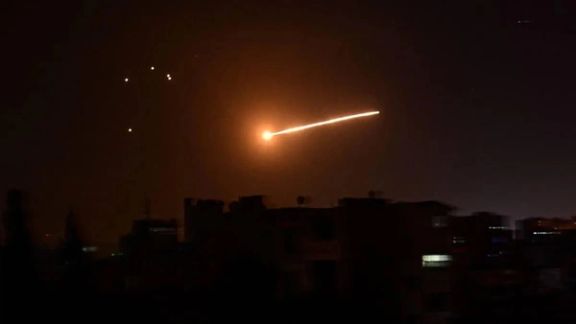
Syria said on Wednesday that Israel carried out missile strikes near the village of Hader in the southern Quneitra province, which borders Israel.

Syria said on Wednesday that Israel carried out missile strikes near the village of Hader in the southern Quneitra province, which borders Israel.
Syria’s state news agency SANA reported that an act of “Israeli aggression” was carried out with several surface-to-surface missiles over the vicinity of the Quneitra’s countryside in southern Syria, areas where Tehran-backed forces, including Lebanon’s Hezbollah, have put down a presence since deploying to help President Bashar al-Assad in the Syrian civil war which broke out in 2011.
No casualties were reported in the missile attack, which only caused physical damage.
Israel’s military does not usually comment on specific strikes in Syria but has acknowledged that it has conducted hundreds of attacks against forces under Iranian command in Syria to prevent the Islamic Republic from accumulating weapons and entrenching itself further in the war-torn country.
On Saturday, unknown aircraft attacked positions of Iran-backed forces in and around the eastern city of Deir ez-Zor for the second time within a week.
Last month, Israel allegedly carried out three strikes in Syria.
In March, an Israeli attack over Damascus killed two officers of Iran’s Revolutionary Guard.
On Friday, The Moscow Times, an independent Dutch-based paper, reported that while Russia has begun pulling out its troops from Syria to bolster forces in Ukraine, Iran forces and Lebanese group Hezbollah have reportedly taken over its bases.
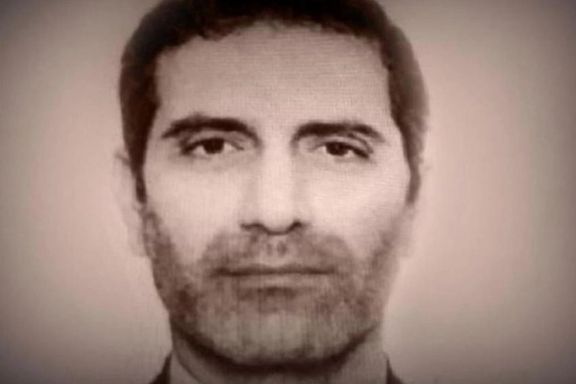
A Belgian court has dismissed appeals by three accomplices of an Iranian diplomat who was convicted of plotting to bomb an opposition rally in France in 2018.
Amir Saadouni (41), Nasimeh Naami (37), and Mehrdad Arefani (58) were arrested in Brussels in June 2018 for involvement in a bombing plot masterminded by Asadollah Assadi (50), the third secretary of the Iranian embassy in Austria.
Saadouni and Naami, a Belgian couple of Iranian origin, were carrying 500 grams of the explosive triacetone triperoxide (TATP) and a detonator in a toiletry bag in their car at the time of their arrest.
The bomb was intended to be used at a gathering of members and supporters of the exiled Iranian opposition group Mujahedin-e Khalq Organization (MEK) in Villepinte near Paris on June 30, 2018.
Arefani, a former supporter of the MEK, was arrested simultaneously at Villepinte, France.
The three have accepted their involvement in the plot but claim they were coerced by Assadi, their handler, and the Iranian intelligence to participate in it. Assadi has always maintained that he did not know the other three defendants.
Iran's foreign ministry spokesman Saeed Khatibzadeh late Tuesday condemned media coverage of the court's decision as an "orchestrated attempt" against Assadi and condemned his arrest and trial as a violation of diplomatic immunity.
The Antwerp appeals court has upheld Naami and Arefani's sentence of 18 and 17 years in prison but increased Saadouni’s sentence from 15 to 18 years. “The court finds the allegation by Saadouni and Naami that they assumed that the explosives would only cause noise and fireworks to be implausible,” the judgment handed down on Tuesday said according to De Morgen, a Dutch Flemish newspaper.
“Everything was meticulously prepared beforehand and the modus operandi to be used was also discussed in detail,” the court said while declaring that there is no doubt that Assadi and the three others worked for the Iranian intelligence ministry.
Assadi, the mastermind of the operation, was arrested in Bavaria, Germany, where he did not enjoy diplomatic immunity, while he was on holiday. German authorities later extradited Assadi to Belgium. He has not appealed his twenty-year sentence.
He is the first Iranian diplomat ever brought to trial in Europe for direct involvement in terrorism. The MEK in a statement in July 2020 alleged that Assadi was a senior official of the Iranian intelligence ministry and the station chief in Austria.
In October 2020 the Belgian Police released the minutes of a meeting with Assadi that indicated he had threatened that an unfavorable verdict in his case could entail possible retaliation by unidentified groups.
Iranian officials say there are no plans to trade EU citizens held in Iran including Ahmadreza Djlali (Jalali), a Swedish-Iranian doctor that Iran says it will execute soon on charges of spying for Israel, with Iranians held in EU countries such as Assadi in Belgium or Hamid Nouri in Sweden. Swedish prosecutors have requested life imprisonment for Nouri over his alleged role in a wave of prison executions in 1988.
The trials of the four suspects and the allegation that Iranian intelligence was behind the bombing plot continues to strain Iran's relations with European countries. Tehran has always dismissed the allegations against its diplomat and in July 2018 summoned the French and Belgian ambassadors and Germany's chargé d'affaires in protest to his arrest.
Tehran accuses European countries of sheltering the MEK which it has for decades persecuted as a terrorist group. MEK which carried out many terrorist attacks of its own in Iran, particularly in the 1980s, was designated as a terrorist organization by the US State Department in 1997 but was delisted in 2012 when it renounced violence.

While Russia has begun pulling out its troops from Syria to bolster forces in Ukraine, Iran forces and Lebanese group Hezbollah have reportedly taken over its bases.
The Moscow Times, an independent Dutch-based paper, said on Friday that several military units have been relocated from bases across Syria to three unnamed airports at the coast of the Mediterranean Sea, from where they will be transferred to Ukraine.
No Russian official or state media has yet confirmed the transfer.
The current number of the Russian forces in Syria is not known but according to the data by the Russian Defense Ministry, about 63 thousand military personnel were stationed in the country in 2015-2018.
Russia has been a staunch military backer of Syria and started to support Syrian President Bashar Assad with airstrikes in 2015 as government forces were struggling in the Syrian civil war.
Assad visited Tehran on Sunday and received praise by Supreme Leader Ali Khamenei and promises of stronger cooperation.
Although the real purpose of the unannounced visit was not clear, it could strengthen perceptions of Iran's meddling in the region, if its military role expands in Syria in the wake of Russia's entanglement in Ukraine, and now the withdrawal of its forces.
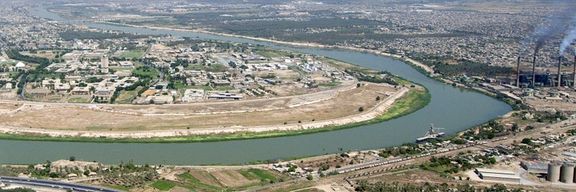
Baghdad will file an international lawsuit against Iran over water disputes, a senior advisor to the Iraqi Ministry of Water Resources said Sunday.
Aoun Diab told the state-funded al-Iraqiya television that the ministry had forwarded a dossier to the government after Iran had failed to respond after requests to discuss its diverting six rivers flowing into Iraq. Diab criticized what he called a lack of cooperation and drew an unfavorable comparison with Turkey given a delegation from Ankara was due to arrive for a field study.
Iraqi officials have for months talked of filing a case with the International Court of Justice, while Iranian officials have suggested Iraq’s chronic water challenge – the United Nations in 2017 ranked it the world’s fifth most vulnerable country to water shortage and food availability – results more from Turkish dams.
In April, Minister of Water Resources Mahdi Rashid al-Hamdani accused Tehran of ignoring Iraqi water rights “even if its dams are filled with water."
Both the Tigris and Euphrates, Iraq’s most important sources of water, originate in Turkey, although tributaries come from Syria and Iran.
Across the Middle East, water shortages have fed tensions between countries and within countries. Iranian officials have warned of a further fall this year in precipitation.
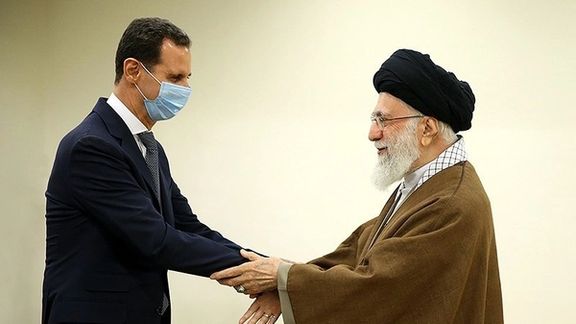
Syrian President Bashar al-Assad paid a quick visit to Tehran Sunday to meet with the Supreme Leader and president for the second time in the past decade.
"Today's Syria is not what it was before the war, although there were no destructions then, but the respect and prestige of Syria is greater than before, and everyone sees this country as a power," Khamenei told Assad, according to Iran' state TV.
Khamenei criticized Arab countries for normalization of relations with Israel. “Some leaders of countries that are neighbors to us and you, have relations with the leaders of the Zionist regime and drink coffee together," he said.
"However, people of the same countries take to the streets on Qods (Quds) Day and chant anti-Zionist slogans, and this is the current reality of the region,” he claimed.
Assad also made a rare trip to the UAE in March, which has normalized its relations with Israel, for the first time since 2011. A week after the visit, Iran's foreign minister, Hossein Amir-Abdollahian took a trip to Damascus during which he said the Islamic Republic welcomed normalization of Syria's relations with Arab countries.
Some Iranians speculated on social media about the possible reasons for the trip, saying that Russia’s invasion of Ukraine might be creating a vacuum in Syria and perhaps a redefinition of Iran’s role.
Referring to the slain commander of the Qods Force of the Revolutionary Guard (IRGC), Ghasem Soleimani, who was killed by American drones in Baghdad in January 2020, Khamenei said Soleimani harbored a "special zeal for Syria" and made sacrifices as he would during Iran's own eight-year war with Iraq (1980-1988).
Soleimani is criticized for involving Iran-backed ground forces in Syria to support Assad and being responsible for the death of tens of thousands of civilians. He supported Russia’s intervention in Syria supplying the ground forces while Moscow used heavy bombing to crush the anti-Assad rebellion.
Khamenei also stressed that the government of President Ebrahim Raisi is "very serious about the issue of Syria" and urged using the opportunity to promote bilateral relations. President Raisi who met separately with the Syrian president said in their meeting that his government's priority was to strengthen strategic ties with Syria.
"Some believe that Iran's support for the "Resistance Axis" is through providing weapons whereas the biggest support and assistance offered by the Islamic Republic is strengthening the spirit of resistance and its continuation," Khamenei said.
Since 2014, the IRGC has deployed brigades of Afghan, Pakistani, and Iraqi Shiites that it has recruited and trained.
In his meeting with Khamenei, Assad stressed the "strategic relations between Iran and Syria" as a major factor in preventing Israel from "dominating the entire region."
According to Nour News, a website linked with the Secretary of Iran's Supreme National Security Council Ali Shamkhani, Assad whose rare visit had not been announced, immediately left Tehran for Damascus.
Assad had visited Tehran once before after the civil war in his country in February 2019. The visit became very controversial as his trip was organized and attended by Soleimani, without the knowledge of the government of Raisi's predecessor, President Hassan Rouhani.
In protest to being kept in the dark, Foreign Minister Mohammad-Javad Zarif who had not even been invited to Khamenei's meeting with Assad resigned from his post. The resignation was not accepted by Rouhani who insisted he should remain in his post.
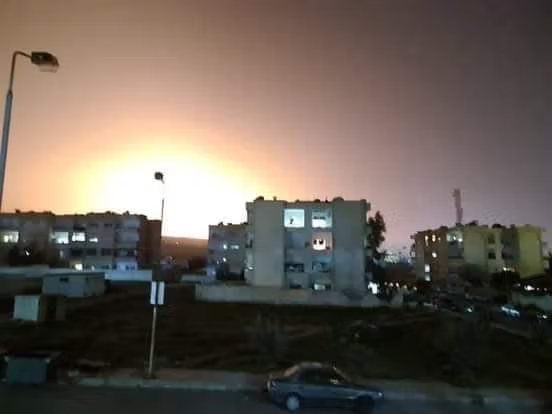
Unknown aircraft Saturday attacked positions of Iran-backed forces in and around Syria’s eastern city of Deir ez-Zor for the second time this week.
The Syrian Observatory for Human Rights (SOHR) said, “Several explosions took place on Saturday in Deir ez-Zor city and its vicinity which are under the control of the regime and Iranian-affiliated militia."
Unidentified warplanes carried out airstrikes against targets in Hawijah Kate and a nearby bridge in the northern part of Deir ez-Zor city, the SOHR said.
Israel frequently targets forces under Iranian command in Syria to prevent the Islamic Republic from accumulating weapons and entrenching itself further in the war-torn country.
Al-Arabiya, however, quoted sources as saying that American drones had launched the attack.
Israel’s military does not usually comment on specific strikes in Syria but has acknowledged that it has conducted hundreds of attacks against Iran-backed groups. It has also claimed several attacks on arms shipments believed to be bound for Hezbollah forces or other Iran-linked groups there.
Last month, Israel allegedly carried out three strikes in Syria.
According to Syrian state media, the latest attack was on April 27, when surface-to-surface missiles were fired from northern Israel at military positions near capital Damascus, killing four Syrian soldiers and injuring three others.
In March, an Israeli attack over the Syrian capital Damascus killed two officers from Iran’s Revolutionary Guard and left some material damage.